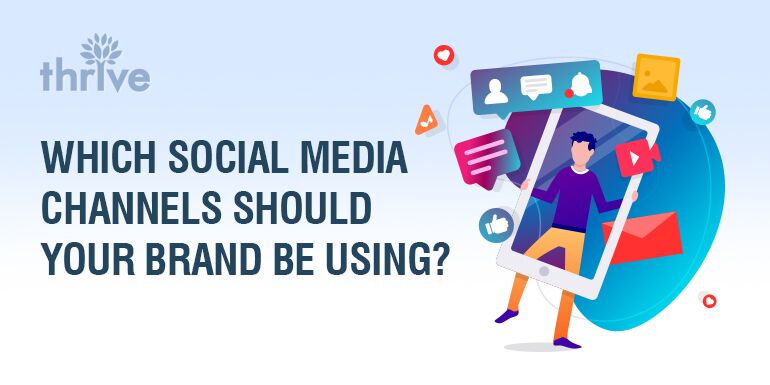Reactions, hashtags, stories and SO MUCH MORE.
With so many social media outlets and user-generated content sites, it’s hard to know what technologies and platforms to choose. Before you get overwhelmed (or maybe you’re already there!), let’s talk through some ideas to help you navigate the social media marketing universe and identify the right platforms for your type of business.
It’s easy for businesses to get sucked into the idea of being on as many social media sites as possible. In our minds, being everywhere translates into reaching the most potential customers, right? But just as in real life, you can’t be everywhere at once and it’s impossible to be everything to everyone.
Be mindful on where you choose to spend your time and concentrate on the platforms that work best for your type of business. The goal is to get your content in front of the right audience for your business.
Picking a social media channel is all about strategy.
Social Media Channels For Retail Businesses
Selecting the best social media platforms for your business requires a little research and some thinking about which site offers the best showcase for your content. The strategy of aligning business goals to social media (like we talked about previously) can help in this process.
For example, a sporting goods store has retail products to sell, along with brand-centric expertise and valuable information for existing and potential customers.
Since they have a mixture of products (physical items) and services (ideas, expertise, information, etc.), they would need to make sure their social media platforms work to showcase both physical products and the thoughts and voice of their brand to an audience of both hobbyists and professionals.
In this case, Facebook, which has a broad user base of people of all ages and abilities, would be an ideal choice. It has the added benefit of having both visual and scripted cues in the form of images/videos and written posts, which allow for a physical display of products and informational posts showcasing their staff expertise.
Your brand’s content becomes a blend of products and services in your posts, building interest across demographics and reinforcing your brand in the minds of your social followers.
Social Media Channels For Professional Services
So what about businesses that don’t have physical products, but offer services instead? Service providers such as lawyers, consultants, accountants, plumbers, electricians and other professionals and tradesmen have specialized knowledge that they provide to their clients in exchange for a fee.
For many professional services and trade organizations, their marketing relies on convincing the buying public that their team is the most knowledgeable and up-to-date in their respective fields.
This concept is called intellectual or thought leadership and is best shown in social media content through links to relevant materials, commentary on current events or industry updates, and other written posts.
For this type of business, a LinkedIn account is a good way to showcase skills and encourage engagements in a highly professional industry.
Bonus: One in three professionals on the planet are on LinkedIn.
As a business-based social network, LinkedIn users are already using the site with business applications in mind. LinkedIn’s self-publishing blog site, called Pulse, suggests content for LinkedIn users based on their preferences and industries, which expands a businesses’ post reach beyond their current followers and into the path of potential new customers or clients.
Even if you aren’t a service-based business, maintaining an accurate and up-to-date profile on LinkedIn is still important because it denotes your company as a serious business and allows you to control the look and style of your business profile as others on the platform reference it.
Any current or former employees can link to your business’ LinkedIn profile as they complete their work history on their own individual profiles. If your company doesn’t claim or maintain its own business profile, a generic page with your business’ name will be created.
This generic page has limited information and no branded visuals or logos, which means it’s sending a message of neglect to anyone who views it.
Asking customers about their social media preferences is a good first step. Taking ownership of basic business pages on LinkedIn is fairly straightforward and doesn’t require frequent updating. Highly interactive platforms like Twitter and Facebook require a bit more planning, which we’ll cover in our next blog post!
This post is a part of a six article series on how small businesses can leverage social media for success.
- Which Social Media Channels Should Your Brand Be Using
Get Social With Thrive!
We’re well-versed in a variety of social media platforms, and can help you determine which is the best for your business. Call us at 817-642-9686, or contact us online to send a question to one of our social media consultants.

